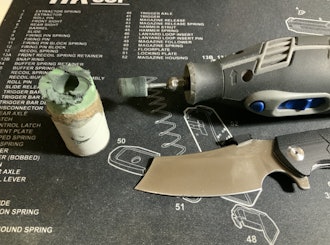Click to view our Accessibility Statement or contact us with accessibility-related questions





The Importance of Preparation in Competitive Magic: The Gathering - Massdrop East/West Article #13
Related Posts
BillA2021
Buy replacement quartz movement
Is an original quartz movement or a suitable substitution available for my Wenger 7900X watch at a reasonable cost, or is this not feasible I’m new at this. Thanks.
Mar 18, 2021

reswright
Basic Flip Smoothing
So you picked up a budget bearing knife as a ‘project’ knife to putter around with and you’re looking for ideas? One thing you can do is polish the bearing works, smoothing both the flip and the close action until you've got some semblance of a noiseless flick open and a smooth, gravity drop shut. This can be done many, many different ways, as many ways as there are to smooth and then polish metal; your humble narrator prefers to use a Dremel, using the following steps. I should probably make some kind of disclaimer statement here - this guide is for people already handy with a Dremel. If you’re not already handy with one it’s best not to learn how to use one while handling pocket knives or other sharp and pointy things. Hand held high RPM rotary grinding tools can be surprisingly violent if they get out of your firm grasp, they can impart an astonishing amount of kinetic energy to small sharp things you're trying to polish, sending them flying further and faster than...
Feb 6, 2021
RayF
RayF's Guide to Thanksgiving Day Watches
Please do enjoy your Thanksgiving (for those of you in countries where that means something), but please, please, please--whatever you do--don't wear either of these tacky watches while you're doing it!
Nov 26, 2020
Trending Posts in More Community Picks

Graham88
Completely surprised by the lack of blade diversity here on Drop...
I’ve been a collector of Blades since before my teens, and a retailer coming up on 15… or maybe 20 years. Drop has really been kind of an interesting experience for me, because I do occasionally get to see some unusual tech and sometimes EDC items that otherwise I might not have been aware of. And maybe it’s because I have a deep love of cutlery and bladed weapons, but I find myself trolling through the site looking at it what’s available; and it’s just it’s pretty much the same. And the bladed community here is just always confused me.. every single knife is about the same, they’re almost all drop points and although the handle materials change and brands change.. it’s really just the same knife over and over and over again... occasionally you’ll see a tanto or a slight variant; but rarely… and almost never a serrated blade. And I’m just deeply amazed at this diversion of serrated blades. And I’m just surprised there isn’t more of a request for diversity here.... and I...
Mar 12, 2020
JellyDPhoto
Can we get Sony E-Mount or other mirrorless camera options please..
Would be nice to see some Sony E mount full frame cameras on here. I currently shoot with a A99 and they killed the lense path for better or more option lenses and now is all E-Mount. 🤔
Jan 13, 2020
RayF
There Are Pandas, and Then There Are Pandas.
And this isn't either of them! The Pandas we're talking about here, are watches, not bears. And what got me thinking about them (again) was a link posted this morning by @cm.rook who pointed a few of us to the very attractive (and not terribly priced) Yema "Rallygraph" Panda which, in it's most traditional arrangement, looks like the one on the left, but can also be had in the version on the right: The model on the left is a true Panda, while the model on the right is called a reverse Panda. The reason for that distinction is clear--Panda bears, only come in the first arrangement. Now at this point, everyone should be thinking about the most well-know Panda, The Rolex Panda, which is actually a Daytona, and among Rolex Daytonas, the most famous of which is the Paul Newman Daytona, which was famous first, because it was Paul's, and second because it sold at auction for $17.8 million (US Dollars). The story of that auction is well-known so I'll only...
Nov 8, 2019








I’ve always been a competitive person and the challenge Magic gave me was what kept me playing for so long. The feeling you get when make the correct play or when you outsmart your opponent feels a lot like when you solve a difficult puzzle. For me, the reward is often more about self-accomplishment rather than the prize at the end of a tournament. I had a lot of fun playing in smaller events where I could spend time with my friends. Until 2014, I never really thought about playing in bigger events such as Pro Tour Qualifiers or Grand Prix. I knew they existed but I didn't want to invest the time required with traveling to events. I was also a student for most of that time and I didn't have the resources to buy all the cards I needed.
I can't really point at an exact moment that made me think about playing magic on a competitive level. It changed when I started seeing my friends from other cities were winning PTQs. They were being flown around the world to play magic and it made me realize that playing in the Pro Tour was a realistic goal.
First year of competitive magic
My first ever premier event was Grand Prix Montréal 2014. I went there with friends and had a great time but I ended up not making day 2. That was a big learning experience for me on how to deal with larger events. I’ve only played in smaller tournaments with 50 or so players. Having more than 1600 people playing magic in one place was overwhelming. My next event was Grand Prix Ottawa 2014. I also didn't make day 2 of that tournament but I got the chance to see some of my friends make it far and they had a shot at making top 8. At that point, I was more determined than ever to try and qualify for the Pro Tour.
Over the course of four months, I played more Magic than ever. I kept up to date with what was being played at all the major events and I spend a lot of time practicing the different matchups and sideboard options. I had the opportunity to play in the last three PTQs before they introduced the new PPTQ/RPTQ system. In those three events, I managed to finish in the top 8 of two of them. At that moment, I realized that the key to my success was preparation. I think the main reason why I had great results in those PTQs as opposed to my last two Grand Prix was because of the time I put in beforehand.
We often hear that the person with the best deck won the tournament. I believe that a person with a decent deck, a good understanding of the game and great preparation has a much higher chance to succeed than someone with “the best” deck that just shows up at a tournament and did very little practice. That may sound obvious but when I ask other people how they did that an event, they often put too much emphasis on what specific deck they were playing and not enough on how much time that person put in to prepare for that event.
Qualifying for my first Pro Tour
In the following months, I kept working hard and it showed in my results. After qualifying for the Regional PTQ, I achieved top 4 and qualified for my first Pro Tour. That was a surreal moment and it didn't quite registered at the time that I had accomplished one of my goal as a Magic player. I was finally rewarded for all the time I put in the game.
I approached the Pro Tour with the same mindset I had before. I chose a solid deck that performed well at a SCG Open and played a lot of games with it. I knew the ins and outs of the deck and was prepared for every matchup. I also played a great amount of draft on Magic Online and I was very confident in my abilities. That being said, my goal for the Pro Tour was to make day 2 and nothing more. Being able to play against the best players in the world to measure my skill was already enough of a challenge.
I started the tournament with two losses in the draft portion. That's obviously not how you want any of your events to begin but at that moment, it never really bothered me. I was there to gain experience and become a better Magic player. For the first time ever, I didn't really care about the implication of every match. What I mean is that I wasn't looking at my overall score during the tournament. I was simply trying to have a good time and play the best Magic that I could.
I then proceeded to win twelve rounds in a row. To be honest, I’m still not sure how that happened. During the rounds, I felt like I had more time to think about game plans and finding ways to win the game rather than just trying to figure out which cards to play each turn. I could clearly see when someone just took a list and brought it to the event without testing. If you play a lot of games with one deck, the correct sequencing of cards becomes very obvious and it makes it easier to see when someone is making sub-optimal play. That happened multiple times during the Pro Tour. I was surprised to see that even at that level, there were players that weren’t aware of basic plays with an already established deck. I ended up getting top 8 in my first ever Pro Tour, an achievement that I never thought I could get.
Joining a professional Magic team
A couple of months later, I got the chance to join an amazing group of Magic players. At that time we didn't have a name but we ended up being known as East West Bowl. (Due to the Team Series restriction of 6 per team, we are now Massdrop East, Massdrop West and Mox Box Bowl). That was a totally new experience for me. At that time, I had been on the Pro Tour circuit for a couple of months only and I didn't know any professional Magic players. It allowed me to get experience at a much faster rate. There is a big difference between talking strategy with a friend and theorizing on the game and actually talking to someone that tried different strategies, and who is able to explain how or why something works.
The following Pro Tour in Atlanta introduced new cards to the Modern format. My teammates put in a lot of time inventing and tuning a new deck and they had an unbelievable performance at the tournament. I knew the team had great magic players in it but I never expected three of us to end up in the top 8. On my part, I had a mediocre finish. I think I was still getting used to the new team environment and I didn't really know how to make good use of it.
Dealing with underwhelming results
My goal for the 2015-2016 season was to hit Gold status. I knew it wasn't going to be difficult considering the number of pro points I already had at the first Pro Tour. I’m convinced I let that have a negative impact on my season. I was practicing but not as much as I did in the past. I surfed the wave of my past success and got the bare minimum done in GPs to get 10 or 11 wins. I chose different decks at the last minute and tried to just use “innate talent” to win. For some Magic players that works but for the majority of us, that's not the case.
At PT Shadows over Innistrad, after weeks of testing different decks, I chose at the last minute and barely played games with it. The deck was really solid and it was also one of the most played deck at the event. I made multiple mistakes and missed day 2 after starting 2-1 in draft. Four months later at the Australian Pro Tour, a similar thing happened. I ended the tournament at 7-8 with 4 wins in draft and only 3 wins in constructed. Unsurprisingly, the same thing happened in Hawaii at PT Kaladesh. At that point, my results weren't due to bad luck.
The schedule for the Pro Tour is organized in such a way that we often choose our deck only a day or two before the event. In my opinion, that is the cause of my lack of result in the constructed portion of the Pro Tour. I came to this conclusion at the last Pro Tour that took place in Dublin. Half of the team (including me) decided to play a deck that I was familiar with. It was basically a list I played in the past adjusted with cards from the new set. The deck had a very similar play style and it helped me save a lot of time during testing. I had an amazing tournament, both in the constructed and limited portion. This was a huge contrast compared to my last 3 Pro Tour performances.
I think the reason why I performed well in draft at most of the PTs was because I usually invest a lot of time in drafts on Magic Online. My efforts are more focused when i'm trying to learn a new draft format as opposed to my usual approach for standard which often revolves around trying a bunch of new ideas and discarding those aren't promising. I need to be more efficient in the time I invest in testing, so that I can be more useful to my teammates and vice-versa. The game isn't going to change anytime soon so I need to adapt as a player and find a way to learn at a faster rate.
Those fundamental aspect of preparation apply to every level of tournament. You could be practicing for a Preliminary PTQ, a Grand Prix or a Pro Tour: there is no shortcut. The only way to maintain great results is to keep putting time and effort towards your goal. Good thing it only took me a year of mediocre results to learn that!
Thanks for reading, and please post any questions or feedback below!
We had an exciting reveal of two Amonkhet masterpieces , check out the video here: https://www.massdrop.com/talk/1482/scouting-report-massdrop-east-west-on-2-amonkhet-masterpieces
If you are curious about our team, check out our intro: https://www.massdrop.com/talk/1117/announcing-team-massdrop-east-west or, read our previous weekly articles:
1. How to Prepare for an MtG Pro Tour by Ben Weitz (https://www.massdrop.com/talk/1158/how-to-prepare-for-an-mt-g-pro-tour)
2. Approaching New Magic Drafts by Ari Lax (https://www.massdrop.com/talk/1193/approaching-new-magic-drafts)
3. Constructed Testing for Pro Tour Aether Revolt by Jarvis Yu (https://www.massdrop.com/talk/1213/recap-of-constructed-testing-for-massdrop-east-west-for-pro-tour-aether-revolt)
4. Breaking into Eternal Formats - Case Study: GP Louisville by Jon Stern (https://www.massdrop.com/talk/1240/breaking-into-eternal-formats-case-study-gp-louisville-massdrop-east-west-article-4)
5. In Good Company - Top 8 at GP Vancouver by Eric Severson (https://www.massdrop.com/talk/1285/in-good-company-top-8-at-gp-vancouver)
6. Adapting to Full Block Kaladesh Limited by Jiachen Tao (https://www.massdrop.com/talk/1323/adapting-to-full-block-kaladesh-limited-massdrop-east-west-article-6)
7. Sorry My Felidar Guardian Ate My Homework by Mark Jacobson (https://www.massdrop.com/talk/1364/sorry-my-felidar-guardian-ate-my-homework-massdrop-east-west-article-7)
8. Taking a Mardu Vacation - Top 8 in New Jersey and Heading to an Eternal Extravaganza by Jarvis Yu (https://www.massdrop.com/talk/1401/taking-a-mardu-vacation-top-8-in-new-jersey-and-heading-to-an-eternal-extravaganza-massdrop-east-wes)
9. A Guide to the Grind by Pascal Maynard (https://www.massdrop.com/talk/1448/a-guide-to-the-grind-massdrop-east-west-article-9)
10. Asking Aggro-vating Questions by Timothy Wu (https://www.massdrop.com/talk/1493/asking-aggro-vating-questions-massdrop-east-west-article-10)
11. The Meat and Potatoes of Jund by Paul Dean (https://www.massdrop.com/talk/1534/the-meat-and-potatoes-of-jund)
12. Hidden Values in Magic: The Gathering for Kids and Parents by Scott Lipp (https://www.massdrop.com/talk/1572/hidden-values-in-magic-the-gathering-for-kids-and-parents-massdrop-east-west-article-12)